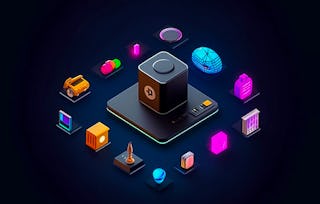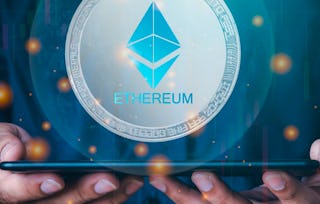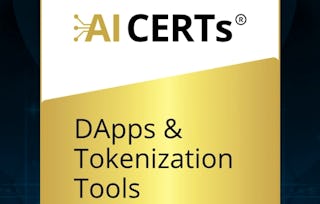This third course of the Blockchain specialization prepares you to design and develop end-to-end decentralized applications (Dapps) – which provide anyone with access to the blockchain’s features and services. You will use Truffle IDE, smart contracts, a simple web client and a MetaMask client. You will learn about the architecture of a Dapp: the front-end client interface, backed by the blockchain and smart contracts. The course covers the basic design of a Dapp, Truffle development process and commands (init, develop, test and migrate), test-driven development of Dapp, Dapp application models and emerging standards that are essential for predictable Dapp behavior.


Decentralized Applications (Dapps)

Decentralized Applications (Dapps)
This course is part of Blockchain Specialization

Instructor: Bina Ramamurthy
47,959 already enrolled
Included with
1,193 reviews
Recommended experience
What you'll learn
This third course of the Blockchain specialization prepares you to design and develop end-to-end decentralized applications (Dapps).
Skills you'll gain
- Software Architecture
- Integrated Development Environments
- Blockchain
- Software Design Patterns
- Software Development Tools
- Test Driven Development (TDD)
- Application Programming Interface (API)
- Development Testing
- Application Development
- Web Applications
- Command-Line Interface
- Web Development Tools
- Skills section collapsed. Showing 6 of 12 skills.
Details to know

Add to your LinkedIn profile
15 assignments
See how employees at top companies are mastering in-demand skills

Build your subject-matter expertise
- Learn new concepts from industry experts
- Gain a foundational understanding of a subject or tool
- Develop job-relevant skills with hands-on projects
- Earn a shareable career certificate

There are 4 modules in this course
We will explore the notion of the blockchain server as the foundation for a Decentralized Application. We will demonstrate how to install the blockchain server and establish a peer-to-peer network of nodes. It is a common practice to develop and test a Dapp on a local test network before deploying it on a public network.
What's included
3 videos3 readings4 assignments
We'll explore the user-friendly environment that Truffle provides for developing and testing a Dapp. We'll explore further the truffle commands such as: develop, init, compile, migrate, test - all with truffle in front of them and with any parameters. This module will illustrate the steps needed in developing and testing a complete Dapp.
What's included
8 videos4 readings4 assignments
In this module, we will discuss a few of the many best practices exclusive to smart contracts and Dapps that will improve your basic Dapp design.
What's included
5 videos3 readings4 assignments
We will discuss Ethereum Improvement Proposal and the ERC process that are essential for keeping Ethereum blockchain updated. We will also explore the standard ERC 20 for token Dapps and ERC 721 for non-fungible tokens.
What's included
4 videos4 readings3 assignments1 programming assignment
Earn a career certificate
Add this credential to your LinkedIn profile, resume, or CV. Share it on social media and in your performance review.
Instructor

Explore more from Software Development
 Status: Free Trial
Status: Free Trial Status: Free Trial
Status: Free TrialBoard Infinity
 Status: Free Trial
Status: Free Trial Status: Free Trial
Status: Free TrialAI CERTs
Why people choose Coursera for their career

Felipe M.

Jennifer J.

Larry W.

Chaitanya A.
Learner reviews
- 5 stars
67%
- 4 stars
21.94%
- 3 stars
6.44%
- 2 stars
2.17%
- 1 star
2.42%
Showing 3 of 1193
Reviewed on Dec 23, 2021
Excellent overview of D-APPS and Smart contract testing. However, the project VM experience could be vastly improved. The VM is very slow to load and execute commands.
Reviewed on Nov 30, 2020
Great course especially if you follow the readings religiously. Only thing is the exercise and snippet are outdated, but that helps in exploring so you don't do copy paste :)
Reviewed on Mar 20, 2021
THis course provide some level of workshop/practice which help me clearly understand the building block of a Dapp. Very useful.

Open new doors with Coursera Plus
Unlimited access to 10,000+ world-class courses, hands-on projects, and job-ready certificate programs - all included in your subscription
Advance your career with an online degree
Earn a degree from world-class universities - 100% online
Join over 3,400 global companies that choose Coursera for Business
Upskill your employees to excel in the digital economy
Frequently asked questions
This course is for anyone interested in designing and developing Dapps.
Mastery of the content of the first course (Blockchain Basics) and second course (Smart Contracts) of this specialization is a prerequisite. Knowledge of at least one modern, high-level programming language is required. Some knowledge of command line interface and JavaScript programming is also necessary.
A laptop or a desktop of this specification: 64 bit machine with minimum 4Gb ram, 10Gb free space and Windows 7 or above , or ubuntu 16.04 or Mac os x 10.0+.
More questions
Financial aid available,



